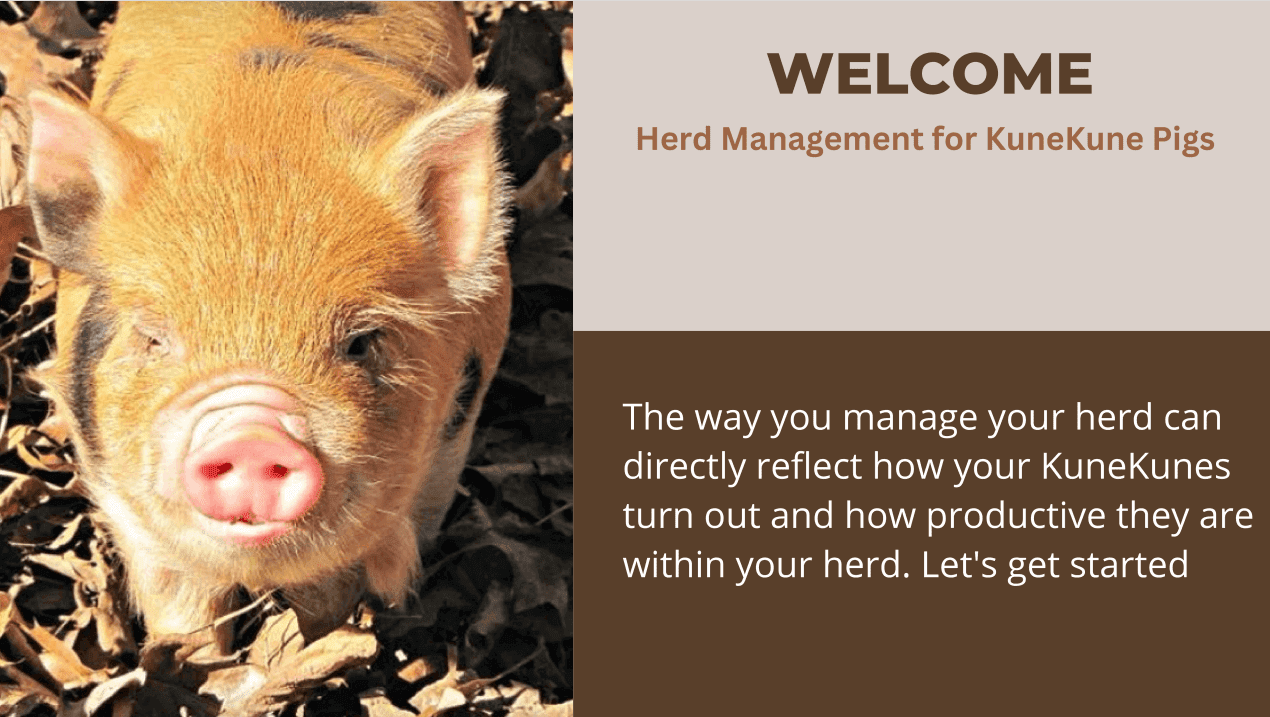
JOIN US
GET OUR KUNEKUNE
NEWSLETTER
New and highly discounted products, fresh and hot stories & useful information
Herd Management of KuneKune Pigs
Video and Article on Herd Management
Herd Management for KuneKune Pigs will directly reflect the herd health management of your herd. It affects reproductive health, age of harvesting KuneKune pigs for KuneKune meat and how your KuneKune piglets turn out. Learn more by reading the article and watching the video below.

Introduction
Herd management is a critical skill for any KuneKune pig farmer and can mean the difference between success and failure. It requires careful attention to detail and a deep understanding of the needs and behaviors of these unique animals. In this comprehensive article, we'll delve into essential topics like choosing the right KuneKune pigs, proper feeding techniques, and housing considerations, as well as providing comprehensive veterinary care to ensure the health and well-being of your herd.
When it comes to selecting the right KuneKune pigs for your farm, it's crucial to consider factors such as breed characteristics, temperament, and overall health. Take the time to research reputable breeders and visit their farms to assess the conditions in which the pigs are raised. Look for pigs that exhibit good conformation, sound structure, and a friendly and docile nature. These traits will not only make handling and management easier but also contribute to a harmonious and stress-free environment for your entire herd.
Some of the topic we will discuss:
Feeding and Nutrition
Herd Rotation
Regular Vet Care and Vaccinations
How your Management Style affects how your piglets turn out.
KuneKune Herd Management Video and Article below
Basic Herd Management Strategies for Herd Health Management
Understanding KuneKune Pigs Nutrition & Health Needs.
KuneKune pig producers need to understand their herd’s nutritional needs and health requirements. Knowing how much to feed is important as KuneKunes are quite easy to overfeed. Feeding two cups twice a day per pig is the usual rule of thumb. This will need to be adjusted from time to time depending on the individual pigs' needs. The biggest factor is the type of diet your KuneKune pigs need. In general, Kunekunes need a diet of 16% protein. We go more in-depth about feeding in the video.
Depending on the age of your animals, they may require slightly different diets or quantities. A sow’s primary nutrition should come from either grass or hay, with grain twice a day. Herd health management is an especially important topic. Knowing the vaccinations, they need and having a deworming schedule is vital to herd health. KuneKune pigs also need access to fresh water sources to maintain good health. By taking the time to understand the specific dietary needs of your herd, you can ensure that they remain healthy and productive. More in the video on this important topic.
Implementing a Breeding Program & Establishing a Herd Rotation Plan.
When establishing a breeding program, it’s important to understand the bloodlines and ensure you are selecting animals with quality genetics. This helps ensure that offspring have desirable traits that make them productive in their given environment and for the purpose you intend to utilize them for. It’s also important to develop a herd rotation plan by rotating grazing areas.
This natural process benefits the land and helps maintain a consistent soil fertility level while producing healthier soils, better life span for plants, increased root depth, drought resistance, and natural weed control. Not only is this beneficial for your KuneKune pigs but it can also save you money overall by eliminating the need for expensive fertilizers and seeding of pastures.
Utilizing the Latest Technology in Herd Management Practices.
With a plethora of technological advancements at our disposal, it's no wonder many KuneKune pig producers and ranchers are looking for ways to maximize the productivity of their herd with the latest technology. From automating feed rations, monitoring temperatures and activity levels, collecting records and data through apps, the options available for herd management are becoming more sophisticated every day.
This is where the KuneKune registry that you select is important. The registries offer a ton of membership benefits, at least IKKPS does, to help breeders be successful. One of the benefits is the online herd book where you can perform much research into the genetics of the animals, see photos of ancestors within the pedigrees that you are considering for being a part of your herd. Running ancestor loss co-efficient and COIs are an important part of planning on the newer members of your herd. In this, IKKPS provides an extremely helpful tool that is right at your fingertips. With the breeder's list, you can easily manage the animals within your herd. This is just another way, IKKPS strives to help KuneKune be successful.
Creating a Monitoring System to Stay on Top of Your Herd’s Needs.
To maintain a herd health management, it is essential to monitor the pasture conditions, enclosures and other features that affect their wellbeing. Consider how often you will feed, checking water sources, and moving them onto greener pastures or thicker living quarters. Daily inspections of your herd are also important to herd management of KuneKune pigs. This is an excellent opportunity to detect an issue before it becomes a major concern. Take a few moments every day to observe the members within your herd. How are they interacting with other members of the herd? Are they eating and drinking? Are they moving around? Daily inspections of your herd will improve the health of your herd.
You may also need to adjust the availability of supplements in different areas of the pasture, according to the needs of diverse groups of animals. Use technological aids and environmental data such as weather systems for planning as well. You don't want to plan new fencing in the winter months when the ground is frozen. Likewise, you don't want to be out in the heat of July fencing. Always try to get your plans done ahead of the rush. By having a monitoring system in place, you can ensure that your KuneKune pigs live productive lives under optimal conditions.
In Conclusion
Hopefully at this point in the article you understand that herd management styles may vary but, they have some key factors in common that can directly influence the overall health of your herd. You must select the pigs that are suited for your purpose. Feeding them a quality diet is important for reproduction. Rotating pastures is important for the soil and land and for your KuneKune pigs. The way you manage your herd will directly reflect how your piglet's turnout as adults, how productive your sows are and even the age that you can harvest your pigs for KuneKune pork.
Additional Research
Registry Office
17500 Hamilton Arms Court Dewitt, VA 23840